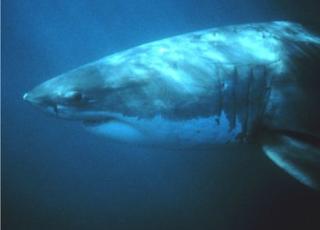
However, sharks evoke a great deal of emotion from divers. Even experienced divers become very nervous at the sight of a great white. These majestic animals can grow to huge lengths and have jaws and teeth to match their awesome reputation. Recently I read a very interesting post about three divers who encountered a huge great white off the coast of South Africa. The story is written from the perspective of the dive master. The divers survived, but I am sure they had an experience that they will never forget.
From my perspective, I have grown fairly interested in sharks in the past year or so. At first I would have nothing to do with sharks and would go to great lengths to avoid them. I guess the problem was that I was influenced (like just about everyone else) by movies like Jaws and other misinformation in the popular media.
Sharks are not the mindless killers that they are sometimes portrayed to be. Sharks like every other animal have instincts that guide them and conform to behavior that is common to their specific species. For example there are really only approximately 39 out of 368 recognized species that are known to have attacked humans, but most attacks are thought to be accidents (probably cases of mistaken identity). There are many factors that contribute to shark attacks, but if you are faced with fending off an overly curious or aggressive shark, you could take a look at the information at this site (link included for information purposes only).
The great white (carcharodon carcharias), bull shark (carcharhinus leucas) and tiger shark (galeocerdo cuvier) are thought to be the most dangerous of the shark family. Each of these sharks is called by different names in different parts of the world. Of these, the great white sharks are the most fearsome and predatory of the group.
From my personal experience, I can honestly say that my irrational fear for sharks has changed to respect and admiration for these perfect "hunting machines". Having been in the water with nurse and many reef sharks, my conclusion is that these animals are graceful, beautiful and nimble. They are something to behold in their natural environment.
I would not like to encounter a huge great white without the security of a cage, and will not participate in chumming. Chumming to my mind sets a dangerous stage where the sharks are artificially lured to where the humans are with fish blood, fish parts and so on. The problem is that eventually, the sharks are conditioned to associate humans with the regular feeding activities. This is not a natural part of the shark's life and the concern is that eventually sharks might associate humans with food. I am not a shark expert by any means, and defer to my friends who are marine biology experts, but the constant feeding and chumming cannot have a good outcome.

No comments:
Post a Comment